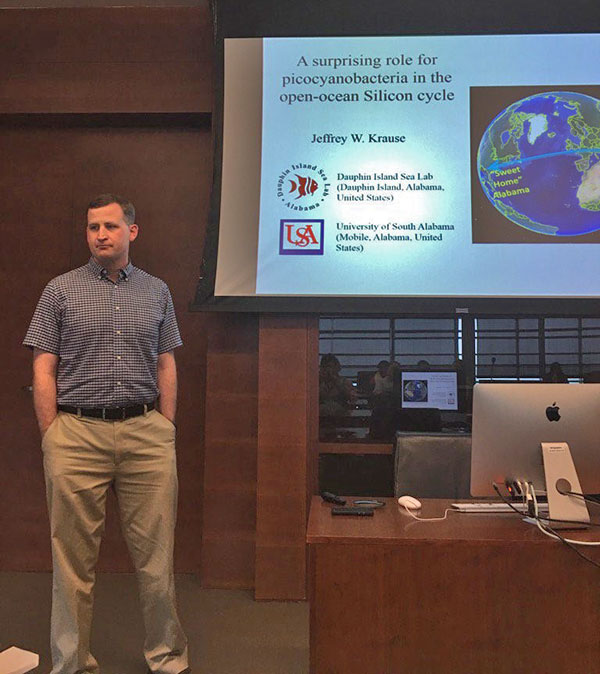
Dr. Jeffrey Krause, the Dauphin Island Sea Lab's phytoplankton ecologist, was invited to King Abdullah University of Science and Technology (KAUST; Thuwal, Kingdom of Saudi Arabia) to present a seminar and participate in an Arctic data workshop.
Dr. Krause’s talk was titled: A surprising role for picocyanobacteria in the open-ocean Silicon cycle. The most numerous photosynthetic microscopic plants in the ocean (collectively termed picocyanobacteria, ~0.001 mm in diameter) were found to accumulate elemental silicon, which challenged the view oceanographers had about the important way the marine carbon and silicon cycles are connected. Results shown in Dr. Krause’s talk, which are currently under review in scientific journals, detail how much silicon these cells have, potential ways it gets into their cells and what this information means for understanding the flow of materials in the open ocean. This work was funded by the United States National Science Foundation (Grant 1335012).
In addition to the invited talk, Dr. Krause’s hosts, Dr. Carlos Duarte and Dr. Susana Agusti, led an Arctic data workshop specifically discussing results from a May 2016 research expedition in the Norwegian sector of the Arctic around the archipelago of Svalbard. Unlike the picocyanobacteria Dr. Krause discussed in his seminar, most of the Arctic data focused on diatoms, a group of microscopic plants (phytoplankton) which produce as much oxygen globally as all the rainforests combined. The data workshop was an opportunity to see all groups’ data together at the same time.
Beyond science, this was Dr. Krause’s first trip to the Middle East.

KAUST is a young academic institution, founded in 2009, and located on the Red Sea. KAUST enrolls only graduate students and is a establishing a reputation as one of the globe’s fastest-growing and influential research institutions. Dr. Krause’s collaboration with Drs. Duarte and Agusti was initiated during the 2015 Wiese Distinguished Lecture which brought Dr. Duarte to Mobile and Dauphin Island. This is an example for how the generosity of the Wiese family’s endowment not only enriched the community but opened doors to international research collaboration.